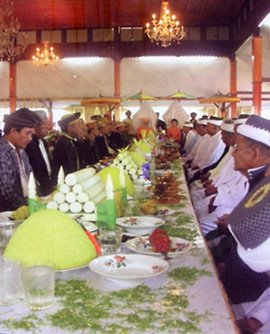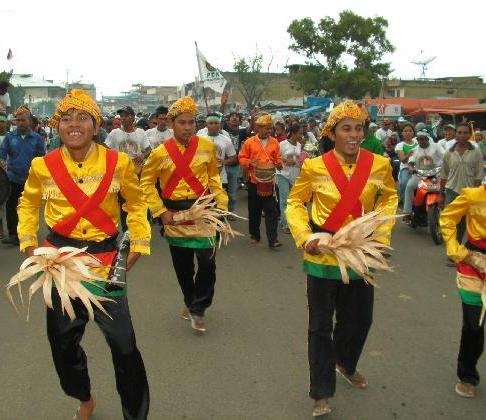(By : Busranto Abdullatif Doa)
Ternate, the most prominent of the four Moluccan sultanates (Ternate, Tidore, Bacan and Jailolo/Gilolo), dates its foundation to 1257 AD. The ruling house traces its origins to the arrival of the Muslim sage, Sayyid Ja'afar Sadik, but the exact line of descent is subject to contradictory genealogies. The genealogies are only certain from the late sixteenth century Sultan Zainal Abidin Syah.
Ternate, the most prominent of the four Moluccan sultanates (Ternate, Tidore, Bacan and Jailolo/Gilolo), dates its foundation to 1257 AD. The ruling house traces its origins to the arrival of the Muslim sage, Sayyid Ja'afar Sadik, but the exact line of descent is subject to contradictory genealogies. The genealogies are only certain from the late sixteenth century Sultan Zainal Abidin Syah.

The island shares a unique history with the neighbouring states of Jailolo, Tidore and Bacan. All four share the same legendary past in which they form a cosmic whole, almost a separate universe or realm. In this universe, each state has its appointed place. Ternate forms the most important unit and its ruler is termed the Kolano Moloku (ruler of the Moluccas). Modern history, however, suggests that Ternate's position owes its place military triumphs, successfully concluded when it vanquished Tidore and Jailolo in 1380.
Located in the midst of the "Spice Islands", Ternate attracted the early attention of European explorers and merchants during the sixteenth century. The Portuguese were the first on the scene and began in local politics and religious affairs almost immediately. They constructed a strong fortress in 1522 and controlled affairs with utter ruthlessness. They deposed or killed rulers, poisoned heirs, and removed whole families removed to Malacca. St Francis Xavier visited the island, looking for converts in 1546. The murder of Sultan Khair ul-Jamal [Hairun], shortly after the conclusion of a treaty of peace, finally stirred the Moluccans into open revolt in 1574. The new Sultan's forces stormed the fortress of Sao Joao Bautista, took it on St Stephen's Day 1575, and expelled the Portuguese.

This substantial victory was not easily forgotten by the Portuguese, or their Spanish successors. The latter sent a strong naval force, which retook the fort in 1606 and removed Sultan Said to Manila. They then set about converting the Sultan and his family to Catholicism.
The arrival of Dutch in 1599 proved fortuitous to Kaicili Muzaffar, the youngest son of Sultan Said. He forged an alliance with the VOC, which enabled him to secure the throne in 1607. The grateful Sultan granted the VOC a lucrative contract with an exclusive spice concession in 1609. However, the embrace of the VOC proved too constricting, especially after they intervened in a succession dispute in 1650. Although a serious conflict erupted in 1683, the Dutch were now firmly established at Amboina, and defeat was inevitable. Thereafter, Ternate effectively became a Dutch protectorate.
Although relations with the Dutch remained peaceful, continuing rivalry with the Tidore resulted in sporadic outbreaks of conflict into the nineteenth century. The British took over control of the Dutch East Indies during the Napoleonic Wars. Having recognised "Nuku", the stormy petrel of Moluccan affairs as Sultan of Tidore, they were able to mediate an effective peace treaty between the two island rivals. However, this peace between the two has never been more than an uneasy one and rivalries continue into the present day.
Although there was an attempt to end the sultanate in 1876 and again in 1916, the Dutch colonial powers changed their minds and relented in the face of popular feeling. They restored the sultanate in 1927 and made no further attempts to destroy the institution.
The years of Japanese occupation and the post-war period of the independence struggle were not easy ones for the island. It formed an important element of Dutch attempts to create an Indonesian Federation in rivalry to the Javanese republican regime. The Sultan served in several important posts, so was "encouraged to spend his time" in an administrative post in Jakarta, after unification in 1950. Nevertheless, the republicans did not deprive him of his titles and honours, and his son and successor duly recognised after his death.
The position of the sultan remains one of significant influence, both politically and in the religious and cultural fields. Most recently, he attracted considerable odium for intervening in the Christian-Muslim riots and ethnic disturbances of 1999. He had tried to protect a minority ethnic group, most of whom followed Protestant faiths. The government exiled him in September 2000. (www.4dw.net)
This entry was posted
on Friday, 4 May 2007
at Friday, May 04, 2007
. You can follow any responses to this entry through the
.


















